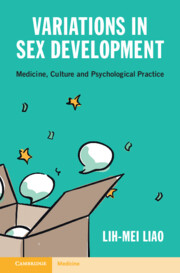Refine search
Actions for selected content:
29 results
Chapter 21 - Shelley’s Sexless Sexuality
- from Part II - Intellectual, Cultural, and Political Contexts
-
-
- Book:
- Percy Shelley in Context
- Published online:
- 17 April 2025
- Print publication:
- 24 April 2025, pp 158-164
-
- Chapter
- Export citation
12 - Globalizing European Gender History
-
-
- Book:
- Globalizing Europe
- Published online:
- 06 March 2025
- Print publication:
- 13 March 2025, pp 181-199
-
- Chapter
- Export citation
14 - Trans and Gender Variant Sexualities in History
-
-
- Book:
- The Cambridge World History of Sexualities
- Published online:
- 26 April 2024
- Print publication:
- 16 May 2024, pp 293-314
-
- Chapter
- Export citation
10 - Creatrix Witches, Nonbinary Creatures, and Shelleyan Transmedia
-
-
- Book:
- Percy Shelley for Our Times
- Published online:
- 07 March 2024
- Print publication:
- 14 March 2024, pp 214-237
-
- Chapter
-
- You have access
- Open access
- HTML
- Export citation
Beyond binary gender: creaky voice, gender, and the variationist enterprise
-
- Journal:
- Language Variation and Change / Volume 34 / Issue 2 / July 2022
- Published online by Cambridge University Press:
- 11 January 2023, pp. 215-238
-
- Article
-
- You have access
- Open access
- HTML
- Export citation
Chapter 7 - Dealing with Health Needs and Physical Complaints of Nonbinary Clients
- from Section A - Contextual Transgynecology
-
-
- Book:
- Context, Principles and Practice of TransGynecology
- Published online:
- 22 December 2022
- Print publication:
- 08 December 2022, pp 49-55
-
- Chapter
- Export citation
Chapter 6 - The New Care Standard
- from Section 2 - Medicalization and Resistance
-
- Book:
- Variations in Sex Development
- Published online:
- 18 November 2022
- Print publication:
- 08 December 2022, pp 81-97
-
- Chapter
- Export citation
Chapter 6 - Impact of Stigma and Resilience on the Health of Transgender and Nonbinary People
- from Section A - Contextual Transgynecology
-
-
- Book:
- Context, Principles and Practice of TransGynecology
- Published online:
- 22 December 2022
- Print publication:
- 08 December 2022, pp 39-48
-
- Chapter
- Export citation
Chapter 12 - Disclosure
- from Section 4 - Working Psychologically
-
- Book:
- Variations in Sex Development
- Published online:
- 18 November 2022
- Print publication:
- 08 December 2022, pp 206-227
-
- Chapter
- Export citation
Chapter 2 - Evolving Terms and Definitions
- from Section 2 - Medicalization and Resistance
-
- Book:
- Variations in Sex Development
- Published online:
- 18 November 2022
- Print publication:
- 08 December 2022, pp 15-31
-
- Chapter
- Export citation
Chapter 11 - Assigning Legal Gender
- from Section 4 - Working Psychologically
-
- Book:
- Variations in Sex Development
- Published online:
- 18 November 2022
- Print publication:
- 08 December 2022, pp 188-205
-
- Chapter
- Export citation
Chapter 13 - Sexual Intimacy
- from Section 4 - Working Psychologically
-
- Book:
- Variations in Sex Development
- Published online:
- 18 November 2022
- Print publication:
- 08 December 2022, pp 228-251
-
- Chapter
- Export citation
Chapter 3 - Medical and Psychological Controversies
- from Section 2 - Medicalization and Resistance
-
- Book:
- Variations in Sex Development
- Published online:
- 18 November 2022
- Print publication:
- 08 December 2022, pp 32-45
-
- Chapter
- Export citation
Chapter 14 - Childfreedom
- from Section 4 - Working Psychologically
-
- Book:
- Variations in Sex Development
- Published online:
- 18 November 2022
- Print publication:
- 08 December 2022, pp 252-268
-
- Chapter
- Export citation
Chapter 9 - Choosing “Normalizing” Genital Surgery
- from Section 4 - Working Psychologically
-
- Book:
- Variations in Sex Development
- Published online:
- 18 November 2022
- Print publication:
- 08 December 2022, pp 147-165
-
- Chapter
- Export citation
Chapter 7 - Psychological Practice
- from Section 3 - Psychological Theories and Applications
-
- Book:
- Variations in Sex Development
- Published online:
- 18 November 2022
- Print publication:
- 08 December 2022, pp 101-117
-
- Chapter
- Export citation
Chapter 5 - Advocacy, Public Engagement and Healthcare Reform
- from Section 2 - Medicalization and Resistance
-
- Book:
- Variations in Sex Development
- Published online:
- 18 November 2022
- Print publication:
- 08 December 2022, pp 60-80
-
- Chapter
- Export citation
Chapter 2 - Optimizing Clinical Ob/Gyn Services through Improved Communication with Trans Persons
- from Section A - Contextual Transgynecology
-
-
- Book:
- Context, Principles and Practice of TransGynecology
- Published online:
- 22 December 2022
- Print publication:
- 08 December 2022, pp 9-18
-
- Chapter
- Export citation

Variations in Sex Development
- Medicine, Culture and Psychological Practice
-
- Published online:
- 18 November 2022
- Print publication:
- 08 December 2022
Reconceiving Reproductive Health Systems: Caring for Trans, Nonbinary, and Gender-Expansive People During Pregnancy and Childbirth
-
- Journal:
- Journal of Law, Medicine & Ethics / Volume 50 / Issue 3 / Fall 2022
- Published online by Cambridge University Press:
- 18 November 2022, pp. 471-488
- Print publication:
- Fall 2022
-
- Article
-
- You have access
- Open access
- HTML
- Export citation
